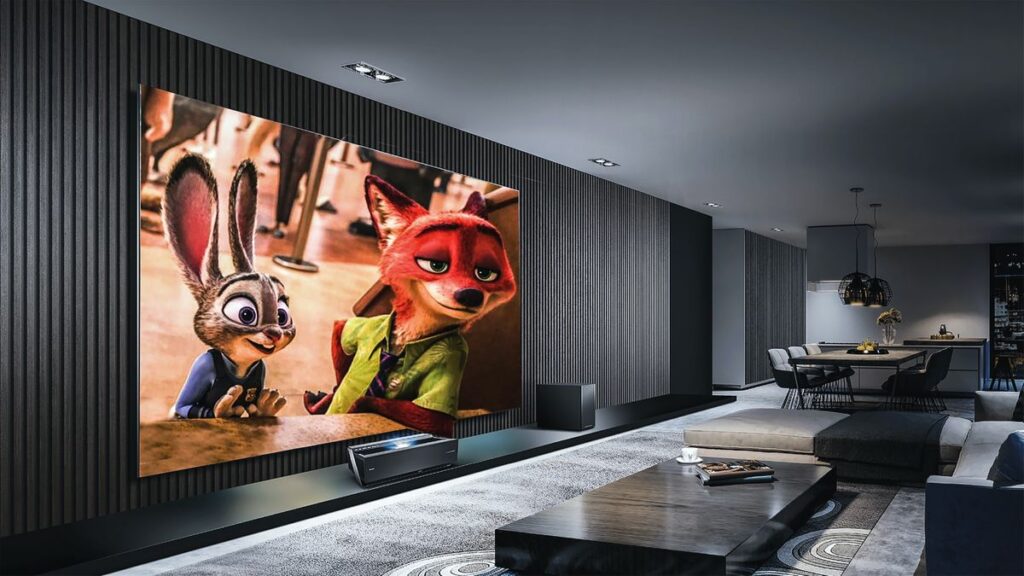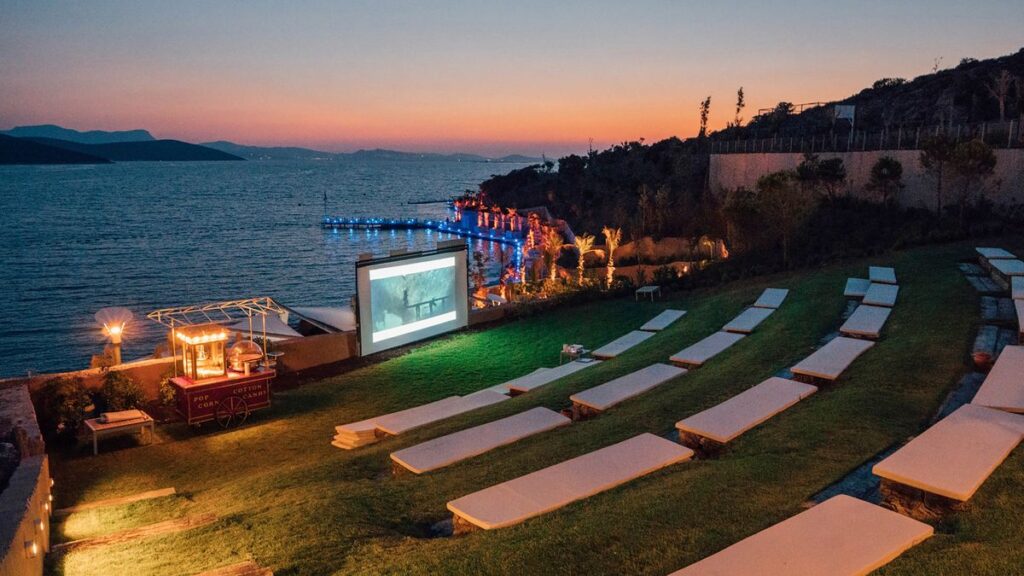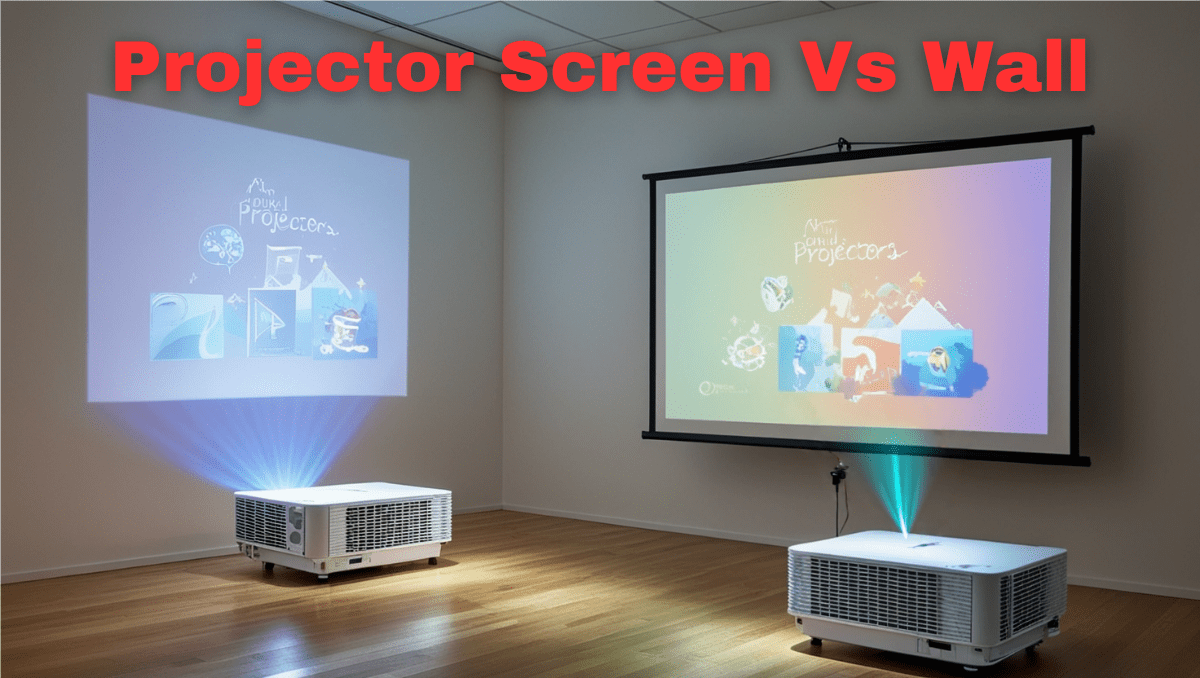Last Updated on July 15, 2024 by Admin
Page Contents
Introduction
Setting up a projector for the first time can be an exciting experience. However, one of the challenges you’ll face is deciding whether to project onto a projector screen or directly onto a wall. It is not an easy decision to make, especially for those who are new to projector technology. That’s why we’ve crafted this article—to explore the difference between a Projector Screen Vs Wall. By understanding these factors and considering your environment and usage, you can determine which option best suits your needs.
In this article, we will begin by exploring the basics of using a projector screen and projecting directly onto a wall. We will examine factors such as image quality, ease of use, versatility, cost, and more, along with the pros and cons of each option. Additionally, we’ll discuss specific use cases where a projector screen excels compared to using a wall, and vice versa.
You can navigate to any specific topic using the Table of Contents. However, we recommend reading the entire article, as every point can provide valuable insights to help you decide which option best suits your needs.
2. Understanding the Basics
2.1 What is a Projector Screen?
A projector screen is a surface specifically designed to enhance the quality of projected images. Projector Screens are made of materials that optimize brightness, color accuracy, and contrast, significantly improving the visual output. They are highly versatile, and today, there are over 14 Different Types of Projector Screens available on the market. To learn more about these options, you can click on the link above.
Understanding projector on screen vs wall dynamics helps in choosing the right projection surface.
2.2 Using a Wall for Projection
Many beginners in projector technology start by projecting onto a wall. While this approach is convenient and cost-effective, as it eliminates the need for purchasing a dedicated screen, it often fails to deliver the optimal experience.
So, why invest in a projector screen if you can simply use a wall? In this discussion, we will explore the benefits and drawbacks of each option to determine which one offers more advantages: projector on wall or screen
You can also check out the comparison between TV Vs Projector.
3. Projector Screen Vs Wall: The Comparison
3.1 Image Quality
The debate over projector screen vs wall often hinges on image quality and viewing experience. Projector screens are specifically designed to reflect light evenly, enhancing brightness and color accuracy. On the other hand, Projecting onto a plain wall may impact the image’s sharpness and clarity, especially when there is ambient light interference.
However, you can improve the projection quality by painting your wall with reflective paint, which can make a significant difference. The benefits of using a projector screen vs white wall include better contrast and reduced ambient light reflection.
For more details, check out our article on Best Wall Color for Projector?
3.2 Reflection Gain:
Reflection gain refers to the amount of light a surface reflects when an image is projected onto it. For projector screens, the reflection gain ranges from 1.0 to 1.5 (Approximately). Whereas, the reflection gain for a wall is considerably lower. This means that a projector screen reflects light much better than a wall. Projector on screen vs wall setups can vary significantly depending on ambient light conditions.
3.3 Brightness & Contrast:
When comparing a Projector Screen Vs Wall, the image projected on the wall will often appear dull, and the colors may look different.
Conversely, projector screens offer much better contrast, which makes the blacks and details more visible. The advantages of using a projector screen over a wall include enhanced brightness and contrast.

3.4 Framed View:
A projector screen often looks like a frame, giving you the feel of watching TV. Additionally, the black border on the screen absorbs light, making the picture appear brighter.
When it comes to projecting on a wall, you can enhance the viewing experience by painting your wall and adding a dark border to it. Yet, the quality that a projector screen offers is difficult for a wall to match.
3.5 Color Saturation & Blacks:
Projector screen vs wall: Which one provides better image clarity and color reproduction?
The color saturation on a projector screen can appear very realistic. However, it also depends on the specific color of the projector screen, a topic we have covered in another article.
Read more on: What is the Best Color for a Projector Screen.
Nevertheless, color saturation generally looks much better on any colored screen compared to a wall. Moreover, blacks appear truly black on a projector screen, whereas on a wall, blacks can appear as dark gray.
3.6 Surroundings:
The most important consideration is your surroundings. A perfectly plain and flat wall is essential for optimal projection quality. Wall decorations can create disturbances in the projected image.
On the other hand, a mechanical projector screen can be placed anywhere in your home and used as needed. You can even place it in front of a TV or in the middle of your living room, as it can retract and save space when not needed. Deciding between projector on wall or screen also depends on your space and viewing preferences.
3.7 Ease of Use and Installation
Installing a projector can be difficult, but installing a projector screen can be even more challenging, depending on the screen type. Proper mounting and adjustments are crucial for an optimal viewing experience. However, once installed correctly, projector screens provide a consistent viewing surface that enhances the overall cinematic experience.
In contrast, walls are readily available and require minimal setup. All you need to ensure is that the wall is free of obstacles and plain for undisturbed visuals.
3.8 Versatility and Portability
Of course, a wall is not portable. Once you paint a wall for projector use, it remains fixed for projecting videos.
However, projector screens offer greater versatility compared to walls. They can be easily retracted (in the case of motorized screens) or moved to different locations if needed. As mentioned earlier, there are over 14 Types of Projector Screens available, offering various options based on your convenience.
3.9 Cost Considerations:
Cost is a major factor influencing why people choose to project on a wall rather than invest in a screen. While projector screens offer numerous benefits, they require an initial investment. Once purchased, screens cannot easily be resized or modified. The cost of projector screens varies based on their size, materials used, and type.
On the other hand, projecting on a wall is cost-free initially. However, to enhance the viewing experience, you may need to invest in reflective paint and add a dark border. While purchasing the paint can incur some expense, you gain flexibility—you can change the color and adjust the size of the projection as needed.
After all, the choice between projector screen vs wall depends largely on your budget and viewing expectations.

4. Pros and Cons of Projector on Screen vs Wall
4.1 Pros of Projector Screens:
- Projector screens provide enhanced image quality with better brightness and color accuracy.
- They are specifically designed for projectors, optimizing the viewing experience.
- Projector screens are available in various types and sizes, allowing users to choose one that best suits their needs.
4.2 Cons of Projector Screens
- Higher initial cost compared to using a wall.
- Installing Projector Screens requires skills and effort.
4.3 Pros of Using a Wall:
- Cost-free if used directly on a plain white wall, with additional costs if the user opts to use reflective paint.
- Ideal for temporary or casual setups.
Check out this 4K Projector Screen Paint.
Projector Screen Paint – High Definition, 4K, Ultra White – QUART

- QUART covers an area of 40 square feet (5 by 8 feet) with two coats, making it washable and easily repairable.
- It is non-toxic with low VOCs, requiring no professional installation and providing straightforward application.
- The screen supports 4K HD resolution with a 1.5 gain and features a reflective, anti-glare finish.
- It is suitable for various settings such as home theaters, churches, conference rooms, museums, art galleries, schools, and outdoor screens.
- It blends seamlessly with decors unlike cumbersome roll-down cloth screens.
4.4 Cons of Using a Wall:
- Does not provide a proper viewing experience as it projects dull and unclear images.
- Once a wall is designated for projection, it cannot be moved or relocated. This lack of portability limits flexibility in setting up the projector in different locations or rooms.
5. Specific Use Cases and Recommendations
If you have decided to go for a Projector Screen, then check out this Projector Screen Buying Guide.
5.1 When to Use a Projector Screen
- If you want to experience better color, brightness, and contrast, you should buy a Projector Screen.
- Projector Screen is ideal for home theatres, providing visual delight and an immersive viewing experience.
- For office or college presentations involving text, a projector screen is essential.
- Moreover, even if your rooms have moderate ambient light interference, Projector Screens perform better compared to walls.
- Projector Screens are perfect for outdoor viewing setups.
5.2 When a Wall Might Be Sufficient
- You can opt to project on a wall if you prefer not to spend money.
- You can use a Projector on the Wall with a flat and plain surface.
- If you can color the wall with reflective paint, and a dark border, it performs nearly as well as a Projector Screen.
- A dark room with minimal ambient light interference is ideal for projecting on walls vs screen.
- If you have a portable projector, you can easily carry it anywhere and project it onto any wall.
- Convenient for temporary use or events where quick setup is essential.
6 Frequently Asked Questions:
Check out: What Can I Use as a Projector Screen? (Projector Screen Alternatives)
Can I Use a White Wall as a Projector Screen?
Yes, you can use a white wall for projection, but it may not provide the same image quality as a dedicated projector screen. Screens are designed to enhance brightness, color accuracy, and contrast, offering a superior viewing experience, especially in controlled lighting.
What is the Difference Between a Projector Screen and a Wall?
A projector screen is optimized to reflect light evenly, improving image clarity and color. Whereas, projecting onto a wall lacks these enhancements, leading to potential variations in image quality based on wall color, texture, and ambient light conditions.

Final Thoughts:
In conclusion, deciding between a projector screen and a wall depends on various factors such as image quality, cost, ease of use, and your specific viewing environment.
Our opinion is, that in most situations, a projector screen generally offers superior performance compared to projecting onto a wall. The primary drawback of using a projector screen is the initial cost involved. However, the enhanced enjoyment and quality of using a projector with a dedicated screen often justify this investment.
Movie theaters invest in high-quality screens despite their cost, opting for them over projecting directly onto walls. This choice underscores the superior quality and experience provided by projector screens. They are particularly beneficial in rooms lacking a flat and plain wall surface.
If you’re on a tight budget, starting with a flat wall for your projector setup is a good option. You can enhance the display quality by using reflective paint and adding a dark border. If you find the results satisfactory, a projector screen may not be necessary.
Choosing between a projector on screen vs wall for your home theater setup depends on your priorities, budget, and viewing environment. Remember, this decision can significantly impact your home cinema enjoyment.
I hope our comparison article on Projector Screen Vs Wall helped you decide Do we need a Screen for Projector or not.
Share Your Projector Setup Experience:
Share your projector setup experience with us! Whether you prefer a projector screen or using a wall, we’d love to hear your thoughts.
Drop a comment below with your feedback or any questions you have.
Also, don’t forget to explore our website for more tips and information on projectors, projector screens, and accessories.

